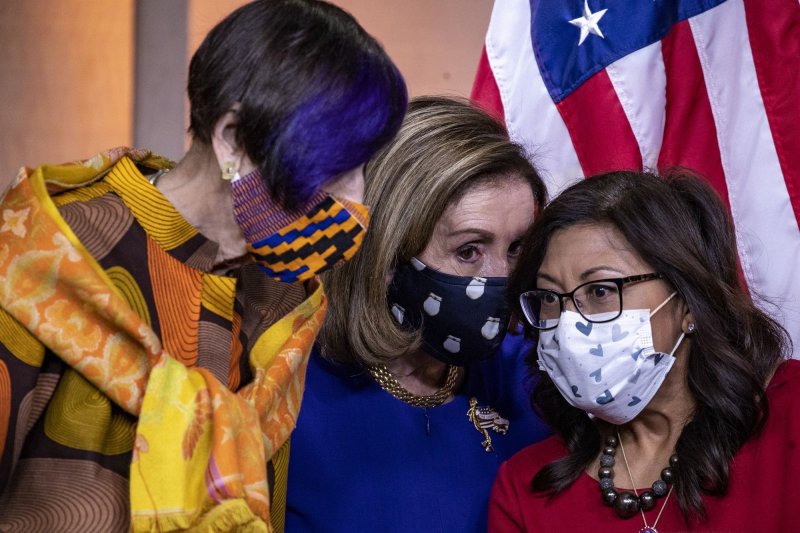gender pay gap

Rep. Rosa DeLauro, D-Conn., (L), Speaker of the House Nancy Pelosi, D-Calif., (C) and Rep. Norma Torres, D-Calif., talk during a press conference at the U.S. Capitol in Washington, D.C. on Thursday. Speaker Pelosi spoke on the Paycheck Fairness Act and said that women make only 82 cents for every dollar a man earns. Photo by Tasos Katopodis/UPI | License Photo
April 15 (UPI) -- The U.S. House of Representatives on Thursday passed legislation to close the gender-wage gap amid the coronavirus pandemic, which has disproportionally affected women.
The Paycheck Fairness Act passed the Democrat-controlled House 217-210 along party lines to limit the defense of employers who are accused of paying their female employees less than their male workers while increasing civil penalties for those found guilty of violations of the federal equal pay provisions.
It also makes it unlawful to require an employee to sign a contract that prohibits them from discussing their salaries with colleagues and beefs up non-retaliation prohibitions.
The bill, which has now passed the House four times but was unable to make it through the Senate, was reintroduced by Rep. Rosa DeLauro, D-Conn., in late January as the economic effects of the coronavirus pandemic have shown to have disproportionally hurt women.

Rep. Rosa DeLauro, D-Conn., (L), Speaker of the House Nancy Pelosi, D-Calif., (C) and Rep. Norma Torres, D-Calif., talk during a press conference at the U.S. Capitol in Washington, D.C. on Thursday. Speaker Pelosi spoke on the Paycheck Fairness Act and said that women make only 82 cents for every dollar a man earns. Photo by Tasos Katopodis/UPI | License Photo
April 15 (UPI) -- The U.S. House of Representatives on Thursday passed legislation to close the gender-wage gap amid the coronavirus pandemic, which has disproportionally affected women.
The Paycheck Fairness Act passed the Democrat-controlled House 217-210 along party lines to limit the defense of employers who are accused of paying their female employees less than their male workers while increasing civil penalties for those found guilty of violations of the federal equal pay provisions.
It also makes it unlawful to require an employee to sign a contract that prohibits them from discussing their salaries with colleagues and beefs up non-retaliation prohibitions.
The bill, which has now passed the House four times but was unable to make it through the Senate, was reintroduced by Rep. Rosa DeLauro, D-Conn., in late January as the economic effects of the coronavirus pandemic have shown to have disproportionally hurt women.
RELATED House committee votes to approve Washington, D.C. statehood
Prior to the vote, DeLauro told reporters during a press conference that women make 82 cents for every dollar a man makes while women of color make even less with Latinos typically making 55 cents, Native Americans 60 cents, Black workers 63 cents and Asian and American Pacific Islanders making 52 cents.
The pandemic, she said, has also made worse these existing inequalities, resulting in more than 5 million women losing their jobs.
"And as we rebuild our economy and as more and more American families rely on women's income, we know that the pay gap not only hurts women but in fact it hurts their families, their families that depend on them," she said. "We need to take transformative change."
RELATED House panel approves bill to pave way for slavery reparations
Republicans as well as business groups railed against the bill viewing it as government overreach.
On Tuesday, the U.S. Chamber of Commerce voiced strong opposition to the bill over its eroding of employer defenses and expanded compensation for violations, among other concerns.
During the floor debate Thursday, Rep. Bob Good, R-Va., argued everyone is in agreement that wage discrimination is wrong and this bill doesn't tackle discrimination, it only targets employers.
RELATED New legislation would eliminate unequal gender-based military expenses
Laws are already in place to ensure fair pay, he argued, and this is an attempt by the Democratic party to "further insert themselves into the workplace with a purported cure for a disease that doesn't exist."
"Democrats are dependent upon the perception of discrimination victimhood to expand their base of power as they continue to divide this nation," he said. "Democrats also view employers, businesses and job creators with disdain that leaving left to their own devices they would seek to harm their employees. Not to worry, big government to the rescue."
Following the bill's passing, President Joe Biden applauded the House, saying closing the gender wage gap is not just an economic imperative but a moral one.
"Equal pay is about justice, fairness and who we are as a nation -- it makes all of us stronger and it represents what America is truly about," he said in a statement, urging the Senate to swiftly pass the legislation to his desk in order to "help us build an economy that rewards the hard work of every American."
Laws are already in place to ensure fair pay, he argued, and this is an attempt by the Democratic party to "further insert themselves into the workplace with a purported cure for a disease that doesn't exist."
"Democrats are dependent upon the perception of discrimination victimhood to expand their base of power as they continue to divide this nation," he said. "Democrats also view employers, businesses and job creators with disdain that leaving left to their own devices they would seek to harm their employees. Not to worry, big government to the rescue."
Following the bill's passing, President Joe Biden applauded the House, saying closing the gender wage gap is not just an economic imperative but a moral one.
"Equal pay is about justice, fairness and who we are as a nation -- it makes all of us stronger and it represents what America is truly about," he said in a statement, urging the Senate to swiftly pass the legislation to his desk in order to "help us build an economy that rewards the hard work of every American."
No comments:
Post a Comment